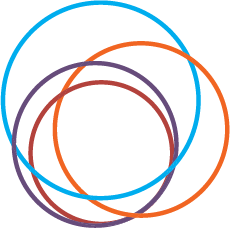"In 1963, I sat in a school assembly and watched a pretty girl join a performer and his dog on stage. The girl was confident and joyful, and she interacted with the performer and his canine sidekick as if she were an 'audience plant'. I thought to myself, "I have to find a way to meet this girl."
Truth be told, I didn't possess the self-esteem that would provide me with the courage to introduce myself. Besides, she was in college prep, destined for greatness, and I would be joining the workforce after high school. Our lives were divergent.
Several months later, a mutual friend arranged a meeting for us. Today, 40 years later, that girl and I are proud parents, and grandparents. We came together in 1963 because of the power of Outfluence, and it has the power to transform your life, too."
-Al Betz, Co-Founder of Outfluence
What is Outfluence?
Outfluence® is a communication model focused on humanity, dignity and contribution. Through others-focused communication we care for others, we earn respect, and we contribute to the good of our communities. The three primary concepts of Outfluence are:
Silent Communication: how you communicate without speaking
Constant Messaging: how all the senses receive communication, whether sent intentionally or unintentionally.
Inspired Performance: how to make your everyday activities more effective and meaningful
As a company, Outfluence, LLC. was created in 2008 and its team members have spoken all over the country at conferences, schools, and corporations about communication and workplace success. Our webinar audience participates from all over the world in our discussions, and the original Outfluence book, titled Outfluence: The Better Way to Influence, was selected as a finalist for the prestigious Eric Hoffer Award.
What is “You Are Here … now what?”
“You Are Here … now what?” (YAHNW) is a program for teens, teachers, administrators, staff, parents and advisers, available for purchase or contract, to complement academics and management with communication skills, personal development and citizenship.
How can I implement “You Are Here … now what?” in my school?
The Program is designed to be presented an average of once a week in 50-minute sessions. There are 40 sessions over the entirety of the high school years.
The program is facilitated by Outfluence certified teachers using lesson plans provided for each of the 40 sessions. The program is ideally offered to all students for the four years of high school. The session topics are the same for each of the 40 Sessions, but the lesson plans focus upon and guide the discussions on issues that are grade-specific and interest-specific to each grade level. Professional development and other programs are available. Please inquire.
What is the facilitation process?
The facilitation process follows the Outfluence philosophy of being “others-focused.” Rather than lecturing or instructing, facilitators invite students to discover and share observations, communicating as they do so. This allows immediate practical application of their learning.
Team exercises deepen awareness of communication styles, and the sharing of observations promotes discovery of personal communication skills already in play. Scenarios, activities, team projects and exploratory discussions lead to self-awareness and more thoughtful attitudes toward others. The facilitators validate the students’ input, summarize the conclusions reached in discussions and relate them to the concepts that “You Are Here … now what?’ presents. Ideas and conclusions are recorded on jumbo “sticky notes” which are then posted around the room for students to view and then review for subsequent Sessions.
Why is the facilitation process so effective?
We have found that students respond enthusiastically to the opportunity to share their thoughts and ideas in an atmosphere where there really are no “wrong” answers. It is an opportunity for self-expression and release. Students discover, through the facilitation model, that others also have questions about the world and their place in it. They share similar challenges. Even the more introverted individuals benefit from hearing the ideas and observations of their more talkative classmates.

